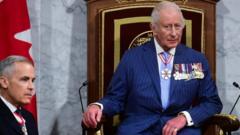In an unprecedented throne speech, King Charles III addressed Canada’s parliament, focusing on national sovereignty in the wake of US tensions and outlining the newly elected Prime Minister Mark Carney's agenda.
Canada's Throne Speech: A Defiant Statement on Sovereignty and Opportunity

Canada's Throne Speech: A Defiant Statement on Sovereignty and Opportunity
King Charles III's address in Ottawa emphasizes Canada's identity amid US tensions and outlines government priorities.
The article text:
In a historic moment for Canada, King Charles III addressed parliament in Ottawa, opening a new session with a focus on Canada’s place in a complex global landscape. This speech marks the first occasion in nearly half a century where a monarch has delivered a throne speech, signaling a notable shift in royal engagement for the Commonwealth nation.
The King, who serves as Canada's head of state, spoke warmly of his visit and the “pleasure and pride” it brought him. His sentiments came at a crucial time, considering the fraught relationship with the United States under President Donald Trump, whose comments regarding Canada’s sovereignty have sparked concern. Tensions were palpable throughout the address, though Trump was not named, with the King subtly reinforcing the importance of Canada’s independence.
One standout quote spoke volumes to the ongoing narrative: “As the anthem reminds us: The True North is indeed strong and free!” Furthermore, the King emphasized the necessity of national pride and unity, underscoring Canada’s evolution into a dynamic and innovative country since Queen Elizabeth II last addressed parliament.
The address also shed light on how Canada must navigate “unprecedented challenges” and changing global dynamics, especially concerning trade relations. With established partnerships being challenged, the King highlighted the need for Canada to strengthen ties with European allies while remaining vigilant in its economic discussions with the US.
In terms of domestic policies, King Charles outlined plans laid out by the Liberal government under Carney aimed at national infrastructural development and economic growth. One commitment included removing barriers to internal trade, a move the government claims could potentially save Canadians over C$200bn annually.
Further, the King articulated domestic challenges, especially in housing affordability, with Carney's pledge to increase construction rates to meet the burgeoning demand. Measures to cut municipal development charges and provide tax relief for first-time home buyers were also promised, showcasing the Liberal government's focus on easing housing costs for Canadians.
The issue of crime was not overlooked, as the King spoke of stronger penalties to address pressing concerns surrounding car thefts and human trafficking. However, some opposition leaders reacted critically, pointing to gaps in the government's plans, particularly concerning climate change policies.
Defense spending was also a critical focus area, with Canada under pressure to meet NATO targets. Carney's commitment to bolster military spending in the coming years aligns with the government’s ongoing discussions to enhance partnerships with European allies amid global security concerns.
As King Charles's speech concluded, it poignantly reminded Canadians of their nation’s resilience and potential during unpredictable times, setting the stage for a pivotal term under new leadership.
In a historic moment for Canada, King Charles III addressed parliament in Ottawa, opening a new session with a focus on Canada’s place in a complex global landscape. This speech marks the first occasion in nearly half a century where a monarch has delivered a throne speech, signaling a notable shift in royal engagement for the Commonwealth nation.
The King, who serves as Canada's head of state, spoke warmly of his visit and the “pleasure and pride” it brought him. His sentiments came at a crucial time, considering the fraught relationship with the United States under President Donald Trump, whose comments regarding Canada’s sovereignty have sparked concern. Tensions were palpable throughout the address, though Trump was not named, with the King subtly reinforcing the importance of Canada’s independence.
One standout quote spoke volumes to the ongoing narrative: “As the anthem reminds us: The True North is indeed strong and free!” Furthermore, the King emphasized the necessity of national pride and unity, underscoring Canada’s evolution into a dynamic and innovative country since Queen Elizabeth II last addressed parliament.
The address also shed light on how Canada must navigate “unprecedented challenges” and changing global dynamics, especially concerning trade relations. With established partnerships being challenged, the King highlighted the need for Canada to strengthen ties with European allies while remaining vigilant in its economic discussions with the US.
In terms of domestic policies, King Charles outlined plans laid out by the Liberal government under Carney aimed at national infrastructural development and economic growth. One commitment included removing barriers to internal trade, a move the government claims could potentially save Canadians over C$200bn annually.
Further, the King articulated domestic challenges, especially in housing affordability, with Carney's pledge to increase construction rates to meet the burgeoning demand. Measures to cut municipal development charges and provide tax relief for first-time home buyers were also promised, showcasing the Liberal government's focus on easing housing costs for Canadians.
The issue of crime was not overlooked, as the King spoke of stronger penalties to address pressing concerns surrounding car thefts and human trafficking. However, some opposition leaders reacted critically, pointing to gaps in the government's plans, particularly concerning climate change policies.
Defense spending was also a critical focus area, with Canada under pressure to meet NATO targets. Carney's commitment to bolster military spending in the coming years aligns with the government’s ongoing discussions to enhance partnerships with European allies amid global security concerns.
As King Charles's speech concluded, it poignantly reminded Canadians of their nation’s resilience and potential during unpredictable times, setting the stage for a pivotal term under new leadership.



















